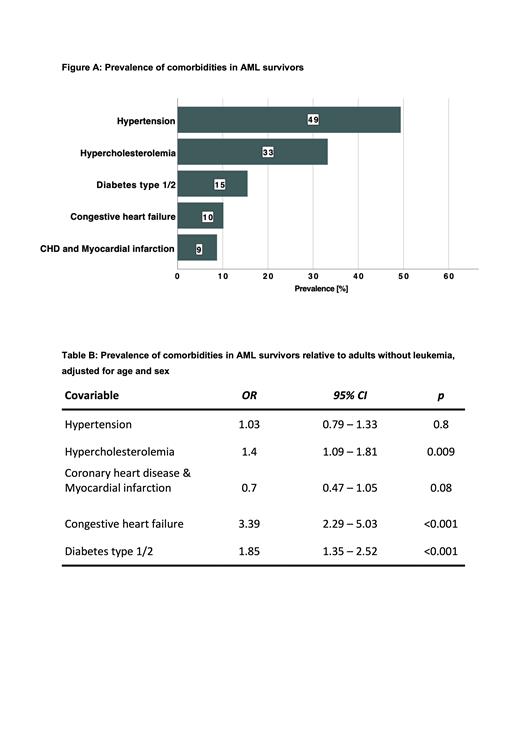Abstract
Introduction: As outcomes of patients with acute myeloid leukemia (AML) have improved over the past decades, the fraction of patients surviving long-term is increasing. Information on long-term somatic and psycho-social health consequences of AML and its treatment is sparse. Previous studies suggested a higher prevalence of cardiovascular diseases in AML survivors, especially those treated with allogeneic stem cell transplantation (alloHSCT). The aim of our study was to perform a multi-dimensional analysis of health outcomes in AML long-term survivors (AML-LTS). This report focuses on somatic, especially cardiovascular, morbidity in AML-LTS. Overall and health-related quality of life are reported separately (Telzerow et al.).
Methods: We conducted a cross-sectional study including AML survivors who had been enrolled in clinical trials or the patient registry of the AML-CG study group and were alive ≥5 years after initial diagnosis. Data concerning somatic health status were collected through patient questionnaires, assessment by the patients' physicians, and medical and laboratory reports. An age- and sex-matched control cohort was derived from German population-based health surveys (Robert Koch Institute, DEGS1 survey; n=6013; persons diagnosed with leukemia [n=11] were excluded).
Results: 427 AML-LTS, aged 28 to 93 years, participated in this study. Data on somatic health status is available for 355 survivors, 5 to 19 years after their AML diagnosis. Thirty-eight percent of survivors were treated with chemotherapy with or without an autologous transplant (autoHSCT), whereas 62% had undergone alloHSCT. Focusing on cardiovascular diseases and risk factors, we found that that 49% of AML-LTS had hypertension, 33% had hypercholesterolemia, 15% had type 1/2 diabetes, 10% had congestive heart failure (CHF), and 9% had coronary artery disease (Figure A). The mean body-mass index (BMI) of AML-LTS was 26.7, similar to the DEGS1 cohort (mean BMI, 26.8).
Next, we compared the prevalence of cardiovascular diseases and risk factors between AML-LTS and the general German population (represented by the DEGS1 sample), using multivariate models adjusting for age and sex (Table B). Compared to persons not diagnosed with leukemia, AML survivors had similar risks of hypertension, coronary heart disease and myocardial infarction. Prevalence of diagnosed hypercholesterolemia was higher in AML-LTS compared to non-AML controls. In addition, AML-LTS had a 2-fold higher risk of having type 1/2 diabetes, and a 3.5-fold increased risk of CHF compared to the general population.
To identify factors associated with the increased risks of diabetes and CHF among AML-LTS, we constructed multivariate models incorporating patient- and treatment related covariables (age, sex, BMI, smoking, prior AML relapse, treatment [chemotherapy + autoHSCT vs. alloHSCT], and type of leukemia [de novo versus secondary / therapy-related]). We found an increased risk of CHF for AML-LTS who had had a relapse (OR, 3.16; 95% CI: 1.46 - 6.83; P=0.004) and, in trend, for patients with sAML or tAML (OR 2.19; 95%CI: 0.92 - 5.22, P=0.076). In addition, we found an increased risk of type 1/2 diabetes for AML-LTS who are smokers (OR: 3.43; 95% CI: 1.43 - 8.21; p: 0.006). Disease- or treatment-related factors did not significantly associate with any of the other comorbidities we studied.
Conclusion: To the best of our knowledge, this is the largest analysis of somatic health outcomes in AML-LTS. Strengths of our study include the relatively large cohort representing a wide age range, the long follow-up period of 5 to nearly 20 years, and the heterogeneity regarding therapy regimens (chemotherapy + autoHSCT vs. alloHSCT). We found that, compared to the general population, AML-LTS have increased risks for CHF and diabetes, but not for hypertension or coronary artery disease. We identified AML relapse as a risk factor for the development of CHF, suggesting that cumulative chemotherapy exposure might be causally involved. On the other hand, we found no treatment- and disease-related risk factors that might explain the higher prevalence of diabetes in AML-LTS. Notably, AML-LTS who had undergone alloHSCT did not have increased risks of CHF, cardiovascular disease, hypertension or diabetes, compared to survivors treated with chemotherapy only. Our results may guide future recommendations for follow-up and inform personalized treatment decisions.
Berdel: Philogen S.p.A.: Consultancy, Current equity holder in publicly-traded company, Honoraria, Membership on an entity's Board of Directors or advisory committees. Hiddemann: Janssen: Research Funding; F. Hoffmann-La Roche: Membership on an entity's Board of Directors or advisory committees, Research Funding. Metzeler: Jazz Pharmaceuticals: Consultancy; Novartis: Consultancy; AbbVie: Honoraria; Celgene/BMS: Consultancy, Honoraria, Research Funding; Daiichi Sankyo: Honoraria; Pfizer: Consultancy; Astellas: Honoraria.


This feature is available to Subscribers Only
Sign In or Create an Account Close Modal